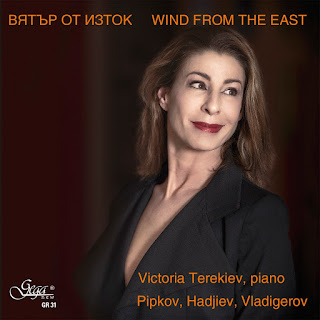Wind from the East, music by Lyubomir Pipkov, Parashkev Hadjiev, Pancho Vladigerov; Victoria Terekiev; Gega
Reviewed by Robert Hugill on Jan 24 2017
Star rating:
Piano music by three seminal Bulgarian composers in engaging performances
Wind from the East, on the Bulgarian label Gega, is the sort of disc where you feel you should know the composers better. The pianist Victoria Terekiev plays piano music by three composers from Bulgaria, all second generation of Bulgarian composers, born between 1899 and 1912. Terekiev plays Lyubomir Pipkov's Bulgarian Suite for piano, Op. 2, Parashkev Hadjiev's Melodic Etudes and Pancho Vladigerov's Bulgarian Songs and Dances, Op.25
Reviewed by Robert Hugill on Jan 24 2017
Star rating:
Piano music by three seminal Bulgarian composers in engaging performances
Wind from the East, on the Bulgarian label Gega, is the sort of disc where you feel you should know the composers better. The pianist Victoria Terekiev plays piano music by three composers from Bulgaria, all second generation of Bulgarian composers, born between 1899 and 1912. Terekiev plays Lyubomir Pipkov's Bulgarian Suite for piano, Op. 2, Parashkev Hadjiev's Melodic Etudes and Pancho Vladigerov's Bulgarian Songs and Dances, Op.25
The generation to which the three composers belonged all received their musical education outside Bulgaria, and would in the 1920s and 1930s be responsible for developing native-trained Bulgarian composers. All three composers on the disc worked in a variety of genres, but all three were remarkable pianists.
Lyubomir Pipkov was the son of the composer Panayot Pipkov. Lyubomir Pipkov studied in Paris at the Ecole Normale de Musique with Paul Dukas and Nadia Boulanger. He returned to Bulgaria in 1932, where in 1933 he was a founder member of the Contemporary Music Society, predecessor of the Union of Bulgarian Composers. His Bulgarian Suite of 1928 is amongst his earliest piano works, written whilst still in Paris. On being shown it Paul Dukas commented 'Pipov has found his road'. The six movements are all folk-based, though Pipkov gives them just Italian tempo markings as titles. There is a certain austerity to the pieces, as many use simply a single line which is decorated or harmonise, but the language, though tonal, brings a real feel of the 20th century.
Parashkev Hadjiev was the song of conductor Todar Hadjiev. he studied under Pancho Vladigerov in Sofia, and Joseph Marx in Vienna. His Melodic Etudes were written in 1950 when he was already and established composer. They are short studies, 19 in all, intended for piano students and getting progressively more complex, often using uneven metres. Each has a descriptive title, lively, with humour, violently etc. There are hints of popular music and his handling of the folk elements reminded me of Granados' piano writing.
Pancho Vladigerov was born in Zurich and the family moved back to Sofia when he was ten. He studied in Sofia with Dobri Hristov, the most distinguished composer of his generation, and later Vladigerov went on to study at the Staatliche Akademische Hochschule fur Musik in Berlin. He continued to work in Berlin until 1932 when he returned to Sofia. Bulgarian Songs and Dances were written in Berlin in 1928. A cycle of five pieces, 'The forest is winding', 'Small-steps horo', 'Vivo' 'Nine years have passed, Yonke', 'God's horo' with the third and fifth being dances. There is a very exotic, folkloric feel to the music and Vladigerov's handling of the folk material is very developed, his writing again evokes Granados and the Bartok of the Romanian Dances, though the basic material is very different.
The pianist Victoria Terekiev was born in Milan of mixed Bulgarian and Italian heritage. On this disc she gives an excellent account of her compatriot's music, playing with kill and engaging enthusiasm.
None of the music on this disc has the sort of radicalism which came from Bartok and Janacek's engagement with their folk heritage, but it is certainly a disc well worth seeking out, shedding light on a corner of classical music which is relatively neglected in Western Europe.
Lyubomir Pipkov (1904-1974) - Bulgarian Suite for piano, Op. 2 [1928]
Parashkev Hadjiev (1912-1992) - Melodic Etudes [1950]
Pancho Vladigerov (1899-1978) - Bulgarian Songs and Dances, Op.25 [1928]
Victoria Terekiev (piano)
Recorded Milan, July 2015
GEGA NEW GR31 1CD [48.14]
Available from Amazon.co.uk.
Elsewhere on this blog:
-
First fruits: Tim Mead's first song recital at Wigmore Hall with James Baillieu - concert review




.jpg)






No comments:
Post a Comment